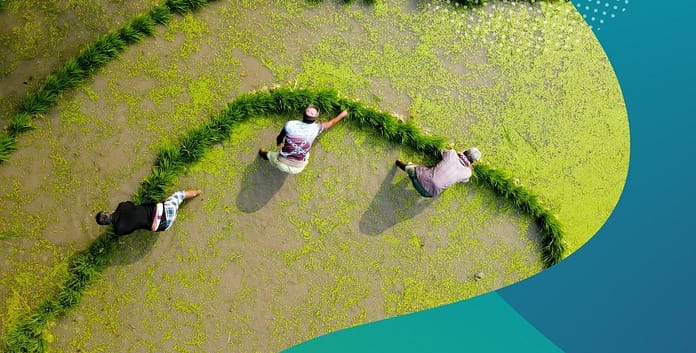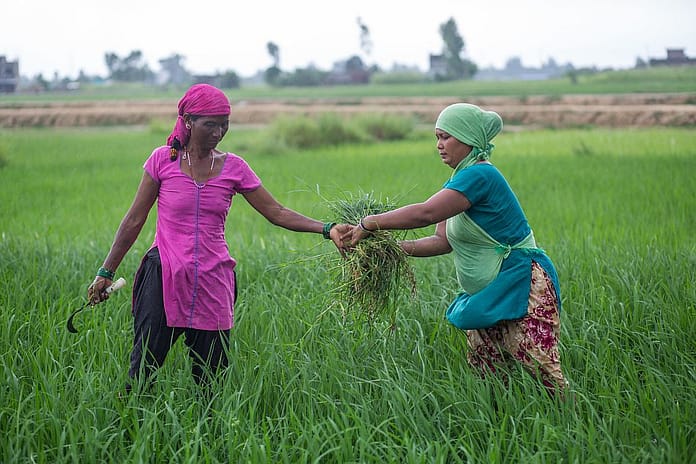
Sri Lanka is recovering from its worst economic crisis since gaining independence: a poly-crisis involving financial, food, electricity and fuel crises. Inflation peaked at 73% in September 2022, with food inflation hitting all time highs, while a ban on fertilizer imports led to a substantial drop in rice production. Electricity, gas and fuel shortages were especially severe in mid-2022, causing major disruptions to livelihoods. These shocks have driven up child malnutrition and mortality, and increased food insecurity as households struggle with high underemployment, soaring prices and major real income losses. In December 2022, 33% of households were facing acute food insecurity, with over half the population resorting to food-based coping strategies such as limiting portions and reducing the number of meals eaten per day. Women have been especially affected, with declining female labor force participation widening gender gaps. As a result, extreme poverty surged fourfold between 2019 and 2022, and by 2023, a quarter of Sri Lankans were living below the poverty line.
Without stronger and more inclusive economic growth, poverty and food insecurity could remain high for years to come. Rising energy prices, as well as regional vulnerability to both floods and drought, also mean that energy and water insecurity remain serious problems in Sri Lanka that intimately interconnected with both chronic and seasonal food insecurity.
In March 2024, Sri Lanka’s government requested CGIAR support for economic revival in rural villages and households, including innovations that integrate livelihoods, food and nutrition security, and resilience.
The International Food Production Research Institute (IFPRI) with the support of the International Water Management Institute (IWMI) responded with the Building Resilience, Inclusive Growth and Holistic Transformation (BRIGHT) integrated panel survey.
Jean Balie, Director, Poverty Reduction Livelihoods and Jobs Impact Area Platform, CGIAR, said, “This is a ground-breaking initiative because many low-and-middle-income countries face shocks that threaten poverty and make sustainable economic growth and transformation more difficult. Balie said the response required effective proper policies but reliable data was often scarce.
Sri Lanka did not have a regular large-scale, multi-thematic survey. Existing surveys date back to before COVID 19 and do not offer a holistic view of the interlinking aspects of poverty and food, water and energy insecurity. This gap in data has hindered a comprehensive understanding of the relationship between water and poverty in Sri Lanka, making it challenging to develop informed, evidence-based policies that effectively address socioeconomic and water-based needs at the national level.
Derek Headey, Principal Investigator of the BRIGHT project, IFPRI, said, “by offering openly accessible and readily available data, we hope to crowd in research from local Sri Lankan undergraduate students to development program implementers to policy analysts in the Sri Lankan government and all those in between.”
This increased capacity is expected to help expand the evidence base needed to guide the key decisions of the government.
The BRIGHT survey, drawing on methodologies and data from previous IFPRI, World Bank, and Household Income and Expenditure Surveys, is crafted in collaboration with experts from Sri Lankan institutions such as the University of Peradeniya and Wayamba University of Sri Lanka.
Survey provides insights into the impact of water and energy on poverty
The survey is innovative in its holistic collection of topics, but also in its use of newly developed modules, such as the water security and energy security modules. The water security module generates information about the kinds of water insecurities households may face, such as not having quality water for drinking or the quantity of water needed for bathing, cooking or cleaning and whether these challenges are due to accessibility or cost.
BRIGHT integrates key water-related indicators throughout the survey to capture a comprehensive understanding of water access and management. It examines both the quality and quantity of drinking water, as well as the time and effort required to obtain it. The survey also explores household strategies for coping with water scarcity or contamination, along with broader aspects of water use, such as irrigation, storage practices, and the financial costs associated with access.
The energy module explores the availability and accessibility of reliable energy and its impact on key areas such as agriculture, income-generating activities, household diets, and daily domestic tasks. It also examines how households adapt to challenges related to energy supply and costs.
Water management specialists can now cross-analyze water and energy indicators alongside broader measures of well-being.
“Water and energy are fundamental to the success of agriculture, serving as essential resources for irrigation, food production, and sustainable farming practices,” said Matthew McCartney, Research Group Leader of the Sustainable Water Infrastructure and Ecosystems, IWMI. “In Sri Lanka, understanding household access to these essential resources is critical for improving food security and enhancing the overall well-being of communities.”
The survey will allow for more robust evidence-based policies that strategically address how water use aligns with livelihoods and living standards, paving the way for strategies that reflect the complex realities of poverty and resource use.
Data collection for BRIGHT is being completed in March 2025, with the survey expected to be released to the public in mid-2025.




